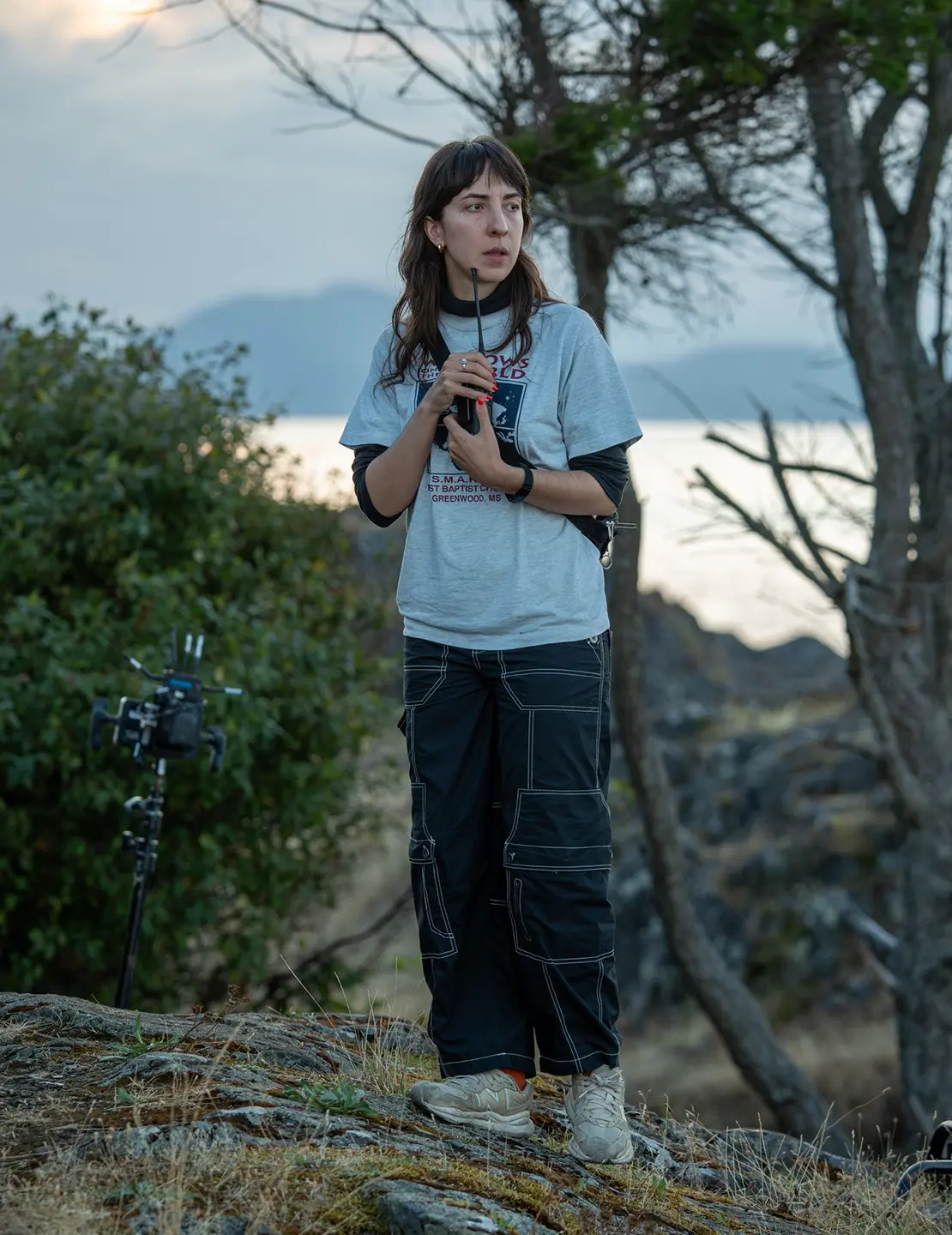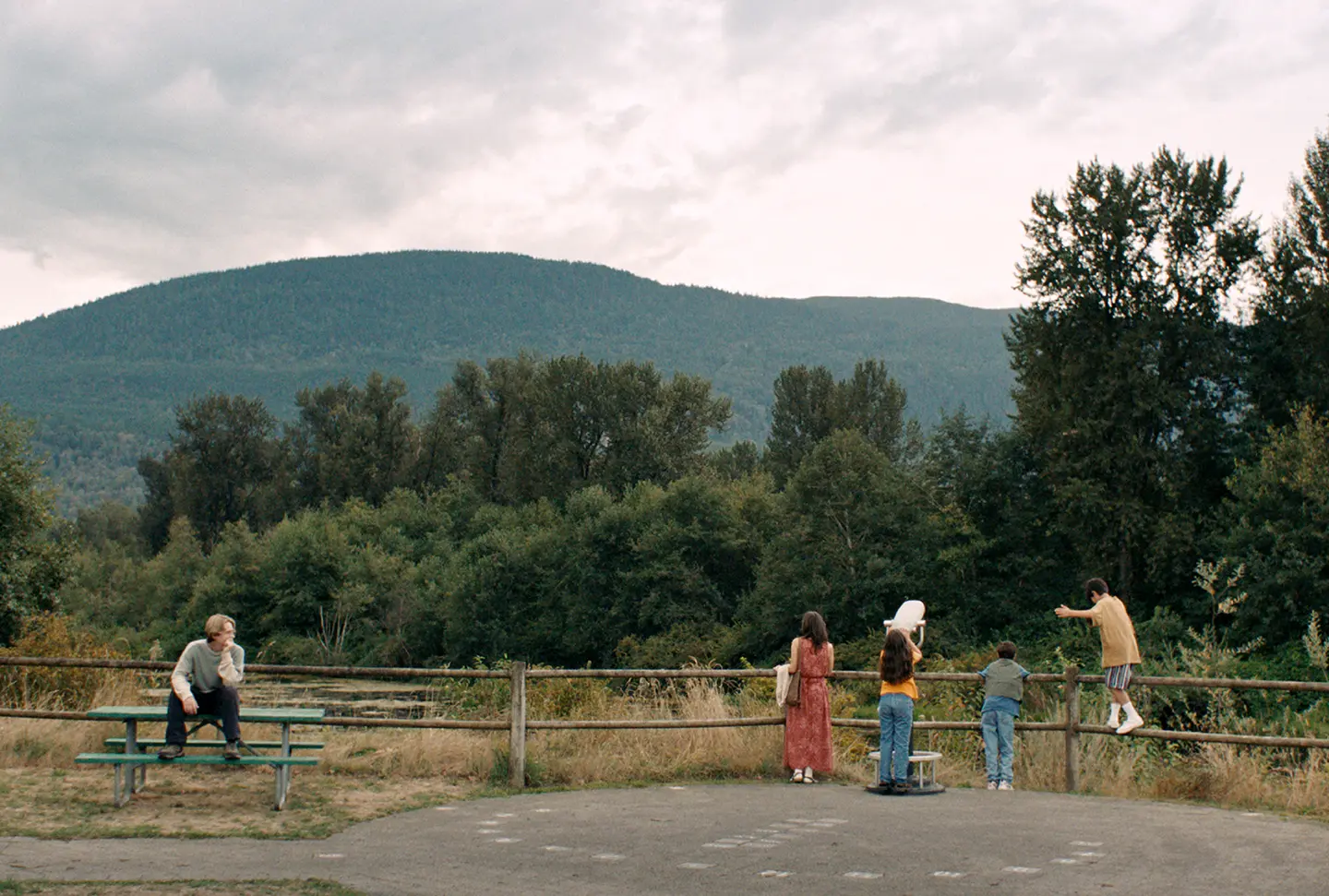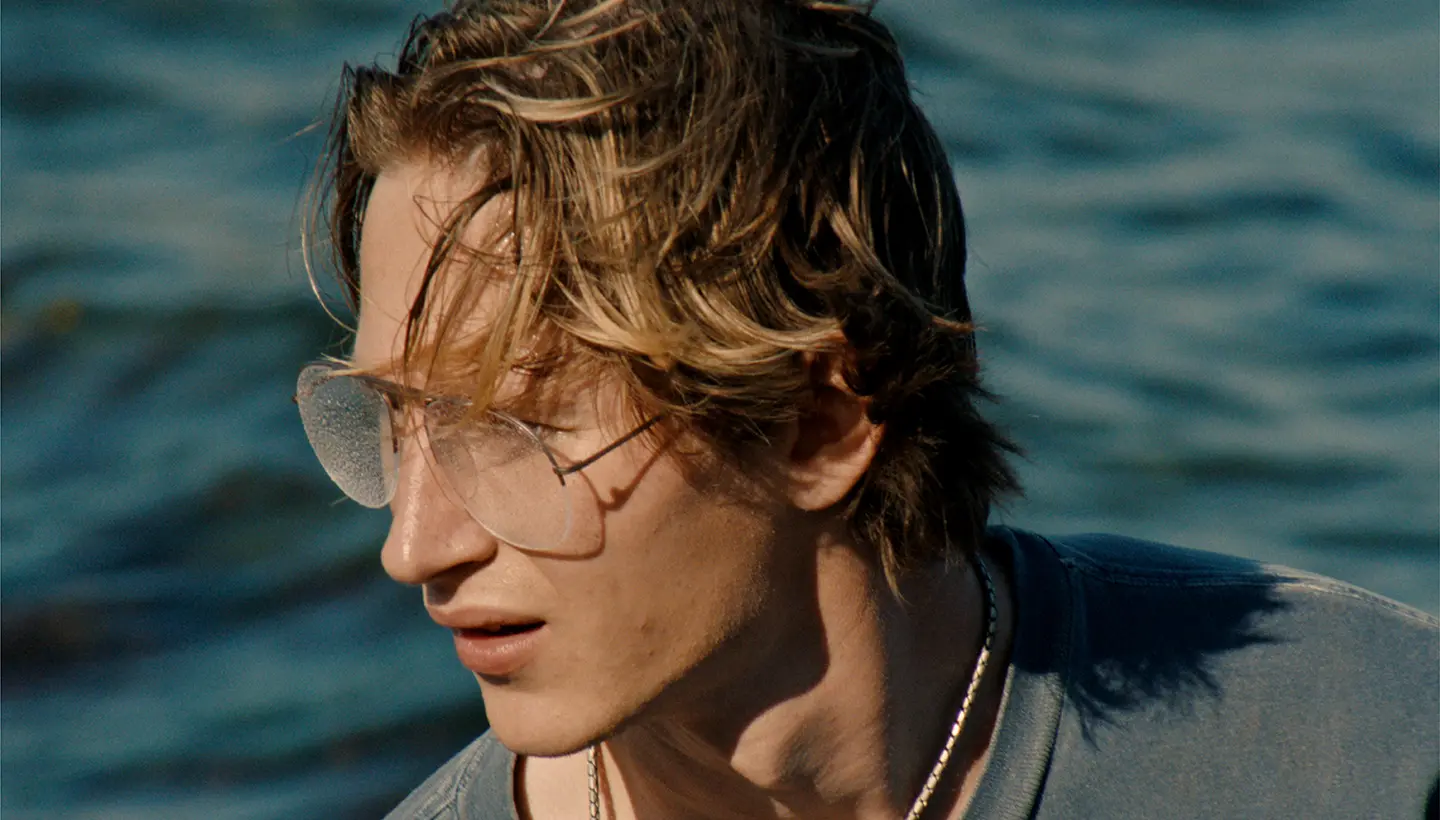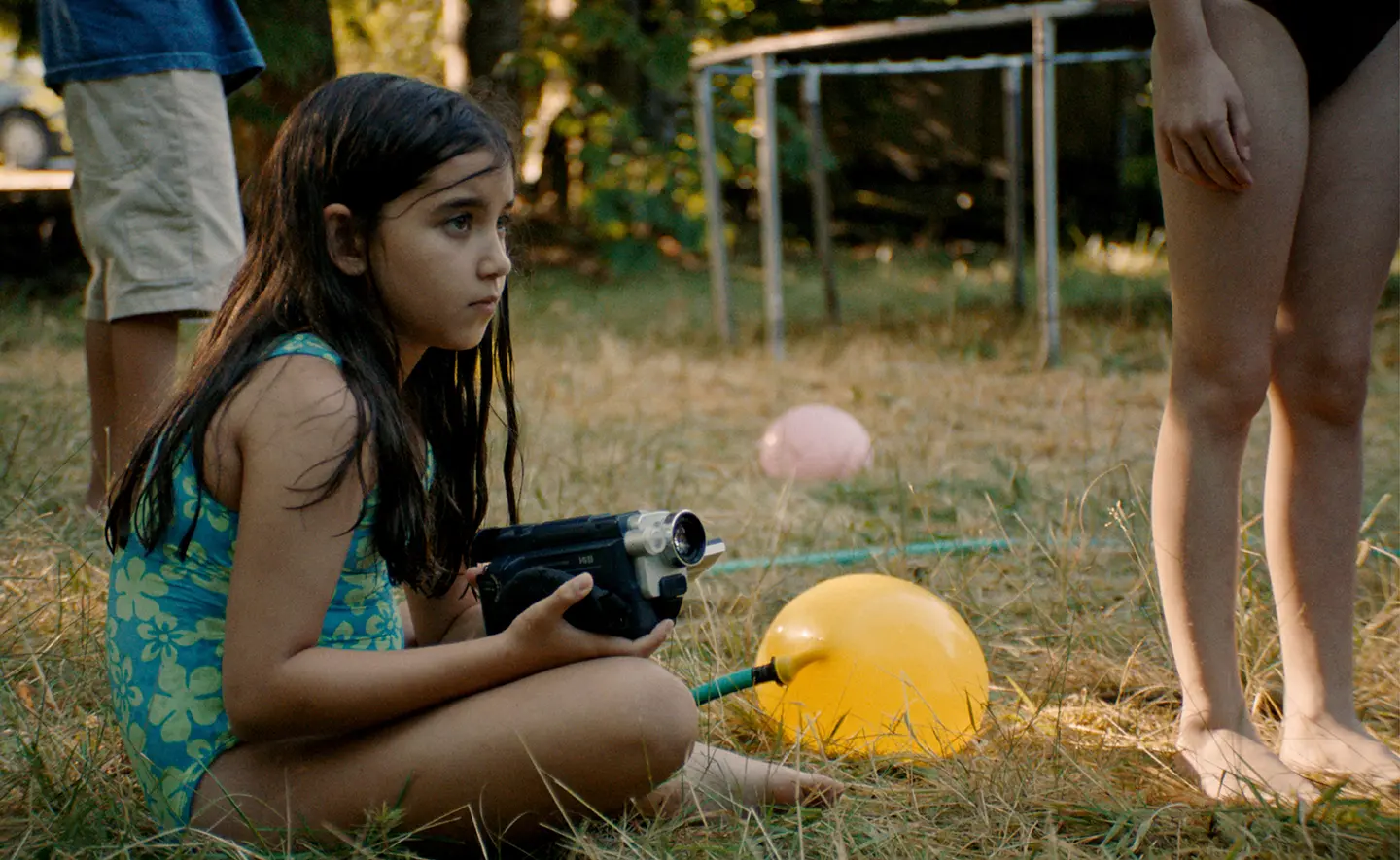About half an hour into Blue Heron, the impressive debut feature film by Sophy Romvari, a father and his four children are developing a photograph in a tiny darkroom at their family home.
“Time is going backwards,” the father says. “It’s a time warp.”
The line is just one of many clues peppered through the movie to remind us that Romvari is exploring that most complex of human faculties: memory. And how fragile and unreliable it can be—suffused with nostalgia, subconsciously edited to protect ourselves, the details made indistinct by the passage of time.

Writer-director Sophy Romvari on the set of Blue Heron. Photo by Robb McCaghren.
The youngest of four siblings—her three brothers emigrated from Hungary with her parents in 1989—Romvari was born in Canada in 1990, growing up with her family on Vancouver Island. She studied film at Capilano University before moving to Toronto for her MFA at York, already a clutch of no-budget, well-regarded short films to her name. We had met while she was still at Cap, catching the same movies at VIFF.
I knew there was tragedy in her life, but it wasn’t until she returned to VIFF in 2020 to screen her graduate film, Still Processing, that its full extent became clear. Her two eldest brothers had died—separately, five years apart—both having struggled with mental health issues. Romvari’s 17-minute short—a hybrid documentary with narrative elements—focused on the discovery of a box of family photos and home movies that had been stored unseen for years. It was a critical success and revealed a maturing filmmaker, both in form and subject.
“Thank you. yes—it was quite a banging start.” It’s a couple of days after Romvari received the best first feature award at this year’s Locarno Film Festival, and we are catching up by video link. Blue Heron premiered in August at the prestigious Swiss fest to a swath of rave reviews in international publications including Variety and Deadline. By the time she returns to Vancouver to screen at this year’s VIFF, the film will have played TIFF and San Sebastian. After Vancouver, she heads back to Europe for the BFI London Film Festival.
The real premiere, however, she says, was back in June on the Island, where she screened it for her parents and her brother Ben while she sat parallel to them on the couch, watching them watching. “It was important for me to show them first.”
Like Still Processing, Romvari’s first feature-length film is an exploration of her family’s grief, this time in fiction form. Nevertheless, there are obvious points of biographical detail—the siblings, the setting, the eldest son’s early troubles and psychiatric interventions.
“It could not have gone better,” she says, smiling, when I ask how her parents responded. “Not only were they moved because of the personal aspect, but more than that, they were both so impressed by the movie and the craft. They are both very artistic people, and I think it exceeded their expectations, artistically. And that was really lovely to experience.
“Am I making up memories, or do I remember being told about certain things? It gets really blurry.”
“There are no secrets in my family,” she notes. “Although my parents are private people, we have always been really frank about everything that’s happened. There’s no repression of emotions—it’s a very open topic of conversation.”
Though the film is, she says, undoubtedly personal, it is not a memoir. “Even for me watching the film, it’s a version of the reality, but the reality was much more harsh,” she says. “My brother as a person was much more extreme. If we saw this in a theatre as a family, it wouldn’t be ‘Oh, that’s us.’ It’s more a simulacrum.”

Blue Heron was shot on Vancouver Island.

Edik Beddoes plays troubled sibling Jeremy.
Indeed, she tells me that while writing the script, she created scenes that she wasn’t sure had actually happened. “Am I making up memories, or do I remember being told about certain things? It gets really blurry. That’s why I say this is a fiction.”
Romvari started writing Blue Heron during the pandemic over Zoom sessions with friends who were working on their own projects—they would all log on for an hour and write in silence. Later, she worked in public libraries, deliberately taking her time, “because I catastrophize,” she explains. “What if this is the only film I ever get to make? I wanted it to be really good.”
And it is: beautifully shot and sensitively edited, this is an affecting and poignant debut, a nuanced and sensitive coming-of-age film that is unafraid to disorient and unsettle. Romvari plays not just with memory, but also time and tone.
To do so, she had to draw on all her experience making something out of nothing. The budget—though a serious upgrade from her early shorts that were often made over a weekend with friends using dollar store props—was still tiny in feature film terms.
“I do think this movie had a big influence on my confidence,” she proffers. “It forces you to look at yourself and work out ‘how do I make decisions I feel good about?’
“Because I had made so many shorts for so little, if not zero, it made me a super-economical filmmaker,” she explains. “I don’t know if just anyone could have made this film on that budget. There were so many techniques I had learned, I was able to cut financial corners.”
When we speak in August, she is in Budapest (the film is a Canadian Hungarian co-production) stretching her stay before she can return to her sublet apartment in Toronto, where her day job is working at the cinema across the street. The life of the independent filmmaker may look glamorous from the outside—in Locarno, she followed Jackie Chan down the red carpet—but Romvari is open about the reality. She tells me there was $500 in her bank account before she was awarded the prize at Locarno, worth around $25,000.
“I’ve been prioritizing my freedom over my stability for as long as I remember,” she says with a shrug. “It’s hitting a bit of a crisis point.
“Will I continue to have to sublet my apartment in order to not be paying rent when I am not there? Likely,” she adds. “It’s like a very glamorous way to be homeless. It’s a sacrifice, but it’s also a huge privilege in many ways. I’m probably going to be tested in the next few months of my capacity to do that,” she admits. “I just have to see this through and see what comes of it.”
Whatever her next project is, the experience of making Blue Heron has been lifechanging. “I feel that since I have finished the film—and this sounds really corny—I feel more myself now than ever before, almost. I accept that I need to live my life for myself and not for my parents,” she explains. “I felt so much grief for them and so much responsibility to make them feel like good parents—which inspired an entire career.
“My parents have never asked or expected anything from me,” she continues. “But I did feel almost a survivor’s guilt. A desire to make up for the loss.”
I ask her if making the film banished those demons in some way, and she nods. “I think this film is, yes, a kind of exorcism—and allowing myself to forgive that of myself and move forward.”
Read more from our Autumn 2025 issue. Blue Heron is playing at the 2025 Vancouver International Film Festival on October 4 and 5.









